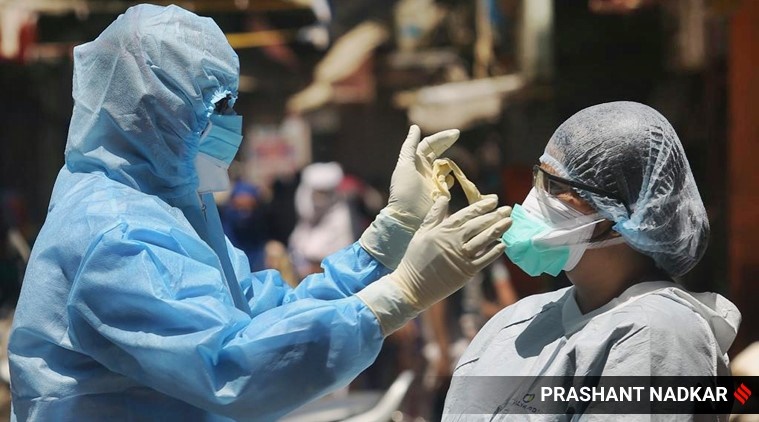 In Chandigarh, apart from non-COVID-19 healthcare staff testing positive for the disease, a few patients who had visited hospitals for non-COVID-19 medical procedures or emergency consultation also tested positive for COVID-19, recently. (Representational)
In Chandigarh, apart from non-COVID-19 healthcare staff testing positive for the disease, a few patients who had visited hospitals for non-COVID-19 medical procedures or emergency consultation also tested positive for COVID-19, recently. (Representational)
In a span of a month, 15 healthcare staff working at the city’s government hospitals have tested positive for COVID-19. Most of these healthcare employees tested positive for the disease in the past week, after a 30-year-old Bapu Dham colony and GMCH-32 ward attendant on duty at an emergency OT ward was diagnosed with the disease. Apart from the 30-year-old ward attendant, 12 other other healthcare workers posted on non-COVID-19 duties were tested positive.
“Without proper maintenance of hygiene standards and following protocol, hospitals become the biggest source of infection. Since the focus has been on dedicated COVID-19 wards and screening spaces, we forget that the infection cannot be contained to these spaces and can easily spread in the whole hospital,” says a virologist from PGIMER, which has a dedicated block for the treatment of COVID-19 patients.
After an infant scheduled for surgery at the Advanced Pediatric Centre of PGIMER tested positive for COVID-19, the hospital administration scrambled to formulate COVID-19 screening and testing policy for patients and staff alike. Later, a staff nurse posted in the emergency ward of the hospital tested positive for the disease. She has no relevant contact or travel history, and resides in the hospital campus.
Out of the 15 healthcare professionals who have contracted the virus, ten are from GMCH-32, all of whom tested positive for the disease in the past week. Like PGIMER, the hospital administration did not have a comprehensive policy for testing and screening patients in non-COVID-19 wards. They did not even test the patients scheduled for elective surgeries in the OT wards and nor were PPE kits provided to staff working in the non-COVID-19 wards of the hospital.
“They have been completely negligent about the safety protocols for staff outside the COVID-19 wards. They woke up only after so many staff members tested positive,” says a junior resident at the hospital, who is currently in quarantine. The resident adds that the abject negligence by hospital administration has disillusioned junior staff to the extent that most do not wish to attend to their duties any more. Even after formulating a policy on testing patients scheduled for surgeries, two elective surgeries were performed at the hospital without testing the patients, on Wednesday and Thursday.
Patients test positive after visiting non-COVID-19 wards
In Chandigarh, apart from non-COVID-19 healthcare staff testing positive for the disease, a few patients who had visited hospitals for non-COVID-19 medical procedures or emergency consultation also tested positive for COVID-19, recently.
In the past three days, a pregnant woman who delivered at GMSH-16 and a 79-year-old woman who visited GMSH-16 for dialysis have tested positive for the disease. Both had no other travel history or contact history.
“We cannot make direct co-relations between the hospital and the patients, but it is safe to say that unless absolutely necessary, a hospital is the last place you want to go if you wish to avoid contracting COVID-19. It is a cesspool of infection,” says the PGIMER virologist.
A recent article in the Lancet Medical journal makes a case for increased testing and screening of symptomatic as well as asymptomatic healthcare workers in order to decrease overall “nosocomial transmission” or transmission through hospitals.
126 doctors quarantined in UT
At least 126 doctors, including 75 from GMCH-32, 44 from PGIMER and six from GMSH-16 are under home quarantine post COVID-19 duty or after being exposed to COVID-19 patients. Apart from the doctors, 24 other members of healthcare staff at GMSH-16 and at least 35 at PGIMER are currently in quarantine. The numbers are even higher at GMCH-32, which has become a COVID-19 hotspot, however, the hospital administration claimed they are still in the process of compiling an exhaustive list due to the ever increasing numbers.